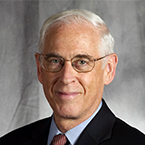
John Mendelsohn, MD, FAACR, a renowned molecular biologist and oncologist whose research contributed to the development of targeted cancer therapies, died January 7, 2019, at age 82.
Mendelsohn died of glioblastoma, a lethal form of brain cancer.
Mendelsohn was born August 31, 1936. He studied physics and chemistry as an undergraduate at Harvard University, and became the first undergraduate to work in the laboratory of James Watson, PhD, who had recently discovered the double-helix structure of DNA with Francis Crick. Mendelsohn went on to study molecular biology in Scotland as a Fulbright Scholar, then earned his medical degree from Harvard Medical School in 1963.
After a research fellowship at the National Institutes of Health and a hematology-oncology fellowship at Washington University Medical School in St. Louis, Mendelsohn joined the faculty at University of California San Diego (UCSD). With colleagues including Gordon Sato, PhD, he produced monoclonal antibody 225, which inhibits cancer cell proliferation by blocking activation of the tyrosine kinase function of the epidermal growth factor receptor. Antibody 225, commercially known as cetuximab (Erbitux), received approval from the U.S. Food and Drug Administration in 2004 for advanced colorectal cancer and in 2006 for head and neck cancer.
From 1970 to 1985, Mendelsohn was a founding director of the UCSD Moores Cancer Center. He then became chairman of the Department of Medicine and co-head of the Program in Molecular Pharmacology and Therapeutics at Memorial Sloan Kettering Cancer Center. Mendelsohn was also a professor and vice chairman of medicine at Cornell University Medical College.
From 1996 to 2011, Mendelsohn served as president of The University of Texas MD Anderson Cancer Center, then became co-director of MD Anderson’s Institute for Personalized Cancer Therapy from 2011 until he announced his retirement in August 2018. Under his leadership, MD Anderson grew dramatically and gained renown for its translational research program.
Mendelsohn was the founding editor-in-chief of Clinical Cancer Research, a journal of the American Association for Cancer Research (AACR). He also served on the AACR Board of Directors from 1990 to 1993. Over the course of his career, he won several prestigious awards from the AACR, including the AACR-Joseph H. Burchenal Clinical Research Award in 1999, the Dorothy P. Landon-AACR Prize for Translational Cancer Research in 2008, and the AACR-Margaret Foti Award for Leadership and Extraordinary Achievements in Cancer Research in 2012. He was inducted as a Fellow of the AACR Academy in 2013.
Mendelsohn also received honors from numerous other professional organizations. He was elected a member of the Institute of Medicine of the National Academy of Sciences and a fellow of the American Academy of Arts and Sciences. As recently as last summer, he was recognized with a share of the Tang Prize in Biopharmaceutical Science for his role in developing targeted therapies.
“John Mendelsohn’s contributions to cancer science have improved and saved the lives of countless cancer patients. He was not only a brilliant physician-scientist; he was also a dynamic leader whose oversight and guidance helped drive the scientific accomplishments of several of our nation’s academic cancer centers,” said Margaret Foti, PhD, MD (hc), chief executive officer of the AACR.
Be the first to add a Remembrance.